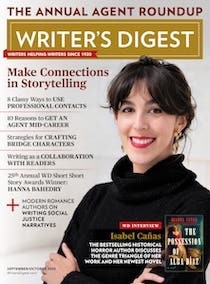3 Reasons Why Thinking Like an Actor Will Help Your Writing
Being a good actor can help you be a good writer. Author William Alexander (GOBLIN SECRETS) explains their differences and connections.
I used to be an actor. Then I became a fiction writer. This transition had very little to do with a spine-injuring production of The Tempest. Neither swords nor backstage ghosts were involved, whatever rumors you might have heard.
In any case, several theatrical skills and lessons turned out to be useful in my new profession. I hereby present three of my favorites:
Order a copy of William Alexander's Goblin Secrets today.
1) You can't be the actor and the director at the same time.
Let me clarify: You can direct and perform in the same show. But you cannot do so at the same time. You must switch hats. Sometimes it helps to use actual hats. Do not attempt to wear both hats at once.
I think of writing in theatrical terms, and generating raw prose on a blank page is roughly equivalent to performing on a bare stage in rehearsal. Do something. Take up space. Then, afterwards, consider what you've done with a critical eye and a directorial (or editorial) hat on your head. Do not attempt to edit prose which does not yet exist. This is paralyzing.
2) Learn what your characters want and fear.
Creative writing courses have appropriated this method from method acting already. The phrase "character objectives" is as common to those classrooms as it is to acting studios. Kurt Vonnegut insisted that "every character should want something, even if it is only a glass of water."
Take this a step further. Pick up a copy of Ute Hagen's A Challenge for the Actor (or at least glance at her Six Steps, listed here). Consider what each of your character wants, and what each one is afraid of--and remember that we aren't always honest with ourselves about either.
3) Tongue twisters make excellent vocal warmups.
Excessive extroversion is a professional hazard for performers. Excessive introversion is a professional hazard for writers--which can make it difficult to conduct interviews or read your work in public. Tongue twisters will help. Any sort of vocal warmup will help. Actors often recite tongue twisters in unison before a show. This has the benefit of 1) stretching vocal muscles, and 2) forcing the performers to do something ridiculous offstage, which will help them feel less ridiculous onstage.
Here's a vocal warmup guaranteed to relax the muscles that your voice depends on. Try it now. You will feel ridiculous, and that's part of the point.
1) Stick out your tongue.
2) Count to ten with your tongue sticking out. Enunciate as much as possible, and start the count over with each added numeral. "One, one two, one two three, one two three four..."
3) Once you get to ten, put your tongue back in. Count to ten once more, straight through. Enunciate.
Now say something aloud. Anything. Feel the difference? You will.
William Alexander studied theater and folklore at Oberlin College and English at the University of Vermont. His short stories have been nominated twice for the Pushcart Prize and published in various strange and wonderful places, including Weird Tales, Lady Churchill's Rosebud Wristlet, Interfictions 2, and Fantasy: The Best of the Year 2008. His first novel, GOBLIN SECRETS, debuted in 2012 for readers ages 8 and up. In a starred review, Kirkus described the book as "evocative in its oddities." It's fun to say "evocative in its oddities" aloud.The book's official website is here.



